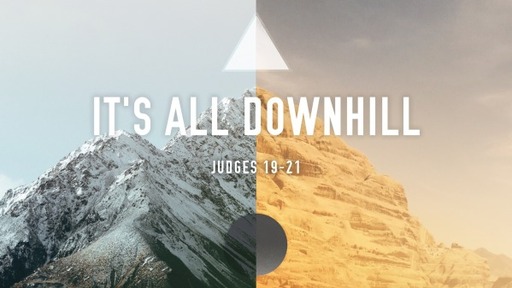It's All Downhill

Notes
Transcript
Everyone does what is right in their own eyes.
Everyone does what is right in their own eyes.
A refrain of these last chapters. A refrain of our own day, if you ask me, but then again you didn’t.
And God spoke all these words:
“I am the Lord your God, who brought you out of Egypt, out of the land of slavery.
“You shall have no other gods before me.
Names are important.
Names are important.
In the final conclusion of the book of Judges we see only one person having a name. The one named has a very minor role in things. Everyone else is anonymous.
The rejection of God in all Israel.
The rejection of God in all Israel.
With the Levite playing another prominent role, also seen in Judges 17-18, we are seeing that once was just on the outskirts of the nation now throughout all. Very few have not been touched. Could this be why Jesus was the harshest with those on the “inside” of things: the Pharisees, Sadducees, and leaders of his day.
People are treated as objects.
People are treated as objects.
This is the result if we start down the path of being “nameless” and rejection of God.
Hospitality invokes community.
Hospitality invokes community.
The idea is that by showing hospitality people can be known by name. The old Cheers tv show had this tagline: where everybody knows your name and is glad you came. This is the power of community. The father-in-law shows this, the people of Gibeah do not. In fact, it is a temporary resident who does so.
This is, in my opinion, what we are missing in today’s culture. We need a return to Biblical hospitality. Maybe we don’t have because we really don’t know what it is. (That’s a sermon series in and of itself).
The cry for justice among us.
The cry for justice among us.
The shocking story found in these pages are reminiscent of what happens in Genesis 19 with Sodom and Gomorrah. What was first seen by those who did not know God is now taking place within the nation of Israel itself. Who in our world have we turned a deaf ear in their cry?
The sin of self.
The sin of self.
In the concluding chapter we have the Levite painting himself in greater light while making the “crime” is heightened in grater magnitude. This is easy when people have no names.
We need greater empathy.
We need greater empathy.
Empathy is not feeling sorry for someone, that is sympathy, it is putting ourselves in their shoes. This is a rough definition. People don’t want/need sympathy.
We need new eyes to see.
We need new eyes to see.
If the Levite, the old man, the tribes of Israel would have had different eyes then things would have been different. They could have had the courage to say “no” to all wrongs, but they didn’t.
God’s Word demands more.
God’s Word demands more.
This is part of what Jesus did in the Sermon on the Mount, took things to a deeper, greater level.
In Christ, we have a new heart, new name, new identity.
In Christ, we have a new heart, new name, new identity.
This is the reason we can be different. This is our only hope.
